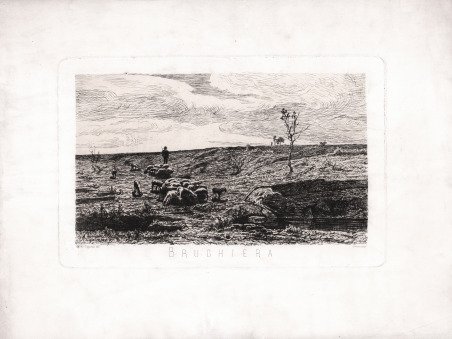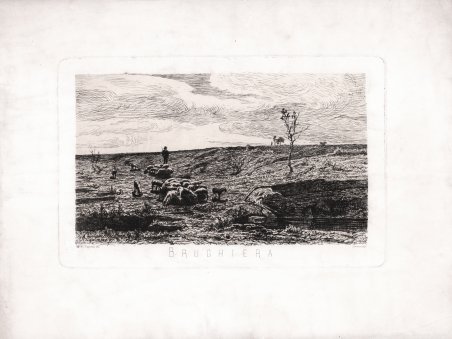Details
Description
Suggestiva veduta pastorale, intitolata "Brughiera", forse raffigurazione della campagna romagnola o toscana o piemontese, località dove visse l'autore, il noto artista bolognese. Incisione originale all'acquaforte, impressa dallo stampatore torinese Carlo Lovera. Il Bignami coniugò l’attività di pittore a quella, prevalente, di acquafortista, legato al gruppo degli incisori piemontesi della seconda metà dell’Ottocento dominato dalla personalità di A. Fontanesi. Tra il 1869 e il 1870 visse a Firenze, che raffigurò spesso nei suoi paesaggi. A Torino partecipò, dal 1863, alle mostre della Società Promotrice, affermandosi nel 1871 con tre dipinti: Il pasto ai pulcini, L'ultima ora del lavoro e Le nebbie del mattino in riva all'Arno. Nello stesso anno si segnalò alla Promotrice di Bologna con due paesaggi giudicati «d’impronta vera e di fattura coscienziosa». Le notizie sulla sua attività espositiva si fermano al 1877, poiché l’artista dovette rinunciare precocemente alla pittura per una malattia agli occhi e per vicissitudini familiari. In ottimo stato di conservazione. Etching, lettered along bottom 'Adolfo Bignami inc Lovera imp.' followed by title “Brughiera”. Printed by Carlo Lovera The plate shows a shepherd herding sheep in the Brughiera. Very good condition. Bignami combined the activity of painter to that, prevalent, etching, linked to the group of Piedmontese engravers of the second half of the nineteenth century dominated by the personality of A. Fontanesi. Between 1869 and 1870 he lived in Florence, which often depicted in his landscapes. In Turin participated, since 1863, the exhibitions of the Society Promotrice, establishing himself in 1871 with three paintings: The meal of chicks, The last hour of work and The morning mists on the banks of the Arno. In the same year he was noticed at the Promotrice of Bologna with two landscapes judged "of true imprint and conscientious workmanship". The news about his exhibition activity stop in 1877, since the artist had to give up painting early because of an eye disease and family vicissitudes. Cfr.


Find out how to use
Find out how to use

